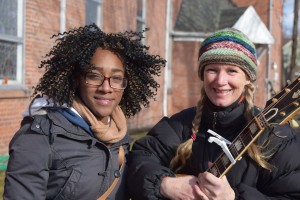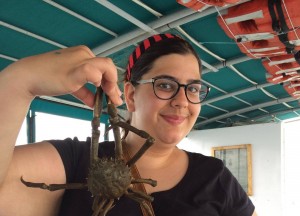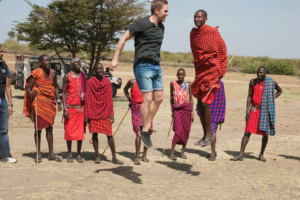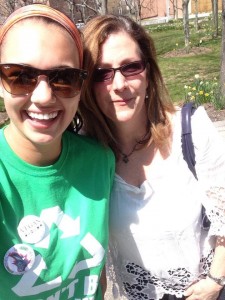“For me, being accepted is another way to meet environmentalists from around the country. I can see what inspires them, and that in turn may inspire me. I am also excited to attend the different workshops, ranging from all about grant-writing to public-speaking.”
Monthly Archives: February 2015
My experience in Kenya
I’ve only been in Nairobi since January 6 of this year, but already the place has made what can only be classified as an indelible impression on me. The vastly different culture, people, and environment found here have all contributed to this feeling. Kenya is a very diverse country and the contrast between the countryside and the city of Nairobi is stark: while rural Kenya offers beautiful nature, and charming small villages, Nairobi is a vibrant third-world metropolis filled with people and traffic.
There are two aspects of my life in Nairobi, the everyday student life, and the more adventurous weekend life where I often travel outside the city. The classes here are a bit different than in the U.S. They are often smaller, and they provide a more Afro-centric view on different academic subjects.
It is fascinating to see how their views differ on the subjects I’ve already learned at Stony Brook University. There are people from all over the continent of Africa at my school, and it is interesting to connect with these people and learn how diverse the continent really is.
On the weekends I travel around in Kenya. I camp in the wild, go on safaris, hike mountains, and visit different parts of the countryside. As a Sustainability Studies major at Stony Brook, it is extremely motivating seeing the beautiful nature and wildlife in Kenya, as it further inspires me to help protect the environment. Seeing animals such as lions and rhinos has truly been an amazing experience.
Besides seeing a lot of nature, I have also joined the climate change branch of an organization called “happy 4 life,” which seeks out sustainable solutions to Kenya’s environmental problems. Interacting with engaged people wanting to make a difference, and fully experiencing Kenya has already taught me a lot, and I am excited to see what is in store for me during the rest of my stay here!

By Sverre Ofstad
Sustainability Studies Program ’15
Sustainability Studies Major
My college experience: finding inspiration and purpose

Andi (fourth from left) with her Sustainability Studies Program classmates and professor, Dr. Jessica Curran (far right) during the 2014 Earthstock festival at Stony Brook University.
After graduating in May 2014 with my BA in Environmental Humanities, I knew it was time to move my career in sustainability forward. So I applied for an internship through the Student Conservation Association (SCA) for a position at a National Park in Vermont. During my phone interview, an SCA recruitment officer asked me: “Why do you want to connect people with nature?”
The perfect question. My response was: “I love nature, I love everything about it and I so desperately want to save it from a human-created demise. That being said, I don’t believe the world will try hard enough to save it unless it sees the environment as I do, as a nurturer. I want to dedicate my life to showing people to love our environment, so they will try as hard as I do to save it.” Or something along those lines. (It was probably crunchier; I was having a moment.)
In my response, I went so far as to quote Earth In Mind, a book by eco-critical author David Orr, which was included in the Sustainability Studies Program curriculum I followed at Stony Brook University. I find Orr’s work not only completely eye-opening, but absolutely inspiring. I find peace with his words and consolidation in his thoughts. Yet it’s incredible to think that I probably would have never read his work if I had not been exposed to it in my studies at Stony Brook.
My answer to the SCA recruitment officer’s question was very much inspired by David Orr, but also by my Sustainability Studies Program professors. Not only did they give me direct inspiration with reading lists, but they served as the actual muses themselves. Dr. Jessica Curran is the reason I still keep a journal, have a blog and write haikus for fun. Dr. Heidi Hutner is the reason I got into activism. She taught me a new kind of passion, a protective and honest passion.
What’s funny is that before I was asked that question during the interview I would not have been able to tell anyone what I specifically wanted to do with my life. But that question was all I needed to realize that I wanted to go into environmental education. Now I am an interning as an environmental educator for N.Y. State Parks, providing experiences for people to have with nature, hoping that these experiences will lead them to love the environment as much as I do.
When people ask me about my experience at Stony Brook University I am not one of those people who complain about classes being too big or professors not knowing my name. That was not my experience. When I talk about Stony Brook I speak of how tight-knit my program was, how my professors not only knew my name but knew my dog and had my phone number. I talk about how I would get a text about a county legislature hearing happening the next day, and my professors would tell me to go, speak up: you must go out and make your voice heard if you’re going to change the world.
By Andi Burrows
Sustainability Studies Program ’14
Environmental Humanities Major
Today Andi is interning as an environmental educator with N.Y. State Parks.
Program alumna works to bring about positive social and environmental change
The Stony Brook University Sustainability Studies Program prides itself in not only what its students do inside the classroom. We’re also highly-focused on helping our students and alumni land meaningful employment in the sustainability sector. We’re especially proud of Shameika Hanson, a program alumna who graduated with her B.A. in Environmental Humanities in May 2014.
Shortly after graduating, Shameika was hired by Beacon, N.Y.-based environmental and social advocacy group Hudson River Sloop Clearwater, Inc. Working as Volunteer Coordinator and Events Supporter, Shameika helps unite people, specifically through music and education, so that they can work together toward positive environmental and social change. Music and education are the two key strategies used by Clearwater, which was founded in the late 1960s by musician and activist Pete Seeger, to bring about such changes.

Shameika Hanson (left) with Clearwater co-worker Linda Richards at the Martin Luther King, Jr. Day celebration in Beacon, N.Y.
On January 20, Shameika attended a Martin Luther King, Jr. Day celebration in Beacon with Clearwater co-worker Linda Richards, director of music and events. Together the pair marched and sang, praising Dr. King for his achievements in civil rights. Shameika described King as “a great person who had great people behind him.” She added, “There’s still work do. We should all be Dr. Kings.”
In her new position at Clearwater, Shameika embraces the spirit of King and other great activists. Through music and education, she encourages Clearwater volunteers and the public to get involved in their communities to help other people and the environment.
The full story on Clearwater’s involvement in the Martin Luther King, Jr. Day celebration in Beacon can be found here.
 Shameika Hanson
Shameika Hanson
Sustainability Studies Program ’14
Environmental Humanities Major






